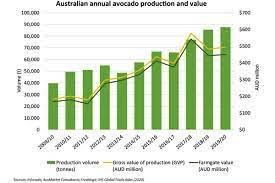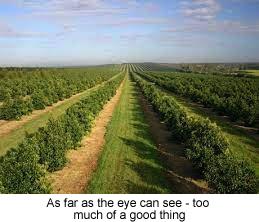 A recent article by Michael Miller, the Sydney correspondent for the Washington Post recently described the plight of farmers in Queensland State who are the victims of concurrent overproduction and diminished demand. During the late-2000s avocados became a staple in salads and as a snack in Australia especially among the young high-income demographic.
A recent article by Michael Miller, the Sydney correspondent for the Washington Post recently described the plight of farmers in Queensland State who are the victims of concurrent overproduction and diminished demand. During the late-2000s avocados became a staple in salads and as a snack in Australia especially among the young high-income demographic.
Responding to anticipated growing demand, farmers planted acreage to avocado orchards and invested in irrigation and harvesting equipment. Many of these trees matured over the past four years and yielded bountiful crops in 2020 after a prolonged drought.  It is estimated that production in 2020 increased by 65 percent over the average of the previous two years. In an unfortunate case of timing, demand crashed as authorities imposed strict COVID shut-down regulations carrying over into 2021.
It is estimated that production in 2020 increased by 65 percent over the average of the previous two years. In an unfortunate case of timing, demand crashed as authorities imposed strict COVID shut-down regulations carrying over into 2021.
Farmers are now faced with a glut of ripe and highly perishable fruit with a farm-gate market price of less than 20 percent of unit value pre-COVID. The response by many farmers is to bear losses from current prices and hope for a restoration in future value. We have seen this movie previously. Currently excess fruit is being dumped as surplus to consumer requirements.
 The lessons from the situation in Australia are:-
The lessons from the situation in Australia are:-
- To be conservative in predicting demand. Although an event such as COVID could not be foreseen, Australia, as the home of the Black Swan, illustrates the effect of external factors on an industry. Examples for egg producers could be a widespread outbreak of HPAI or END that would raise prices for those avoiding infection. The advent of plant-based alternatives to eggs has not proven to be deleterious and mung-bean products are not even the cygnets of Black Swans
- Further processing adds value. While farmers are squashing harvested fruit onto pasture with tractor tires, considerable value could be recovered by extracting avocado oil or incorporating unsold or unprofitable raw fruit into prepared foods or cosmetics. Innovation is the best response to adversity but requires vision and planning
- Export of avocados and derived products, especially if a brand image is established through promotion of quality. Producers in New Zealand did just this with kiwis. With a small population, producers of avocados in Australia were always vulnerable to any disturbance of the equilibrium between supply and demand. Injudicious expansion was a self-inflicted wound. Producers also took for granted continued domestic demand based on consumption by a demographic subject to trends and fads and with distribution through casual dining restaurants a very restricted end point with respect to volume.
- Accurate data regarding expansion of orchards and hence future production, coupled with transparency in price discovery are critical to rational decisions on investment and allocation of resources to a crop or livestock system.
Without resorting to Schadenfreude, that unique Teutonic capacity to derive comfort from the misfortunes of someone else, our egg industry could apply some lessons from the avocado glut in Australia.